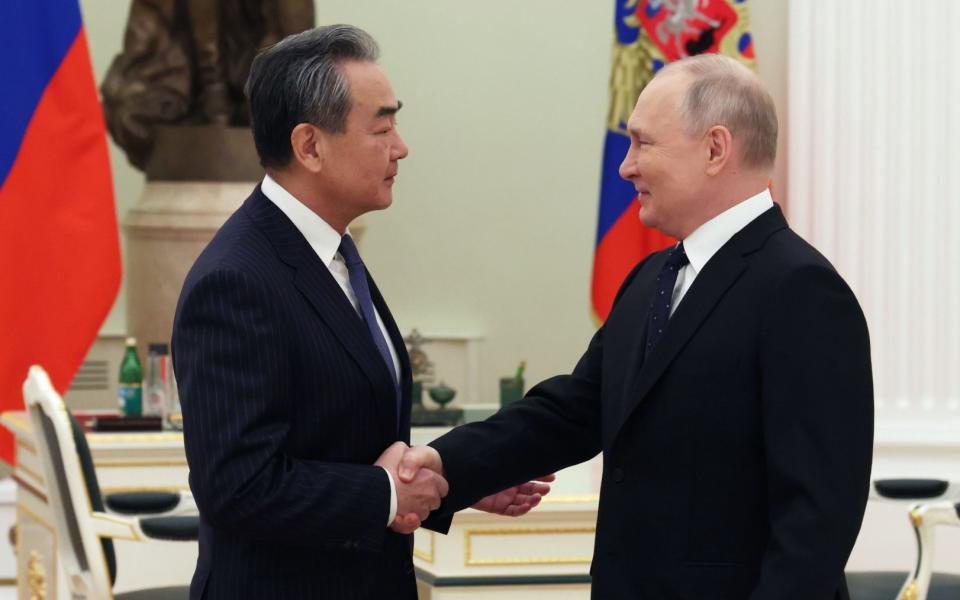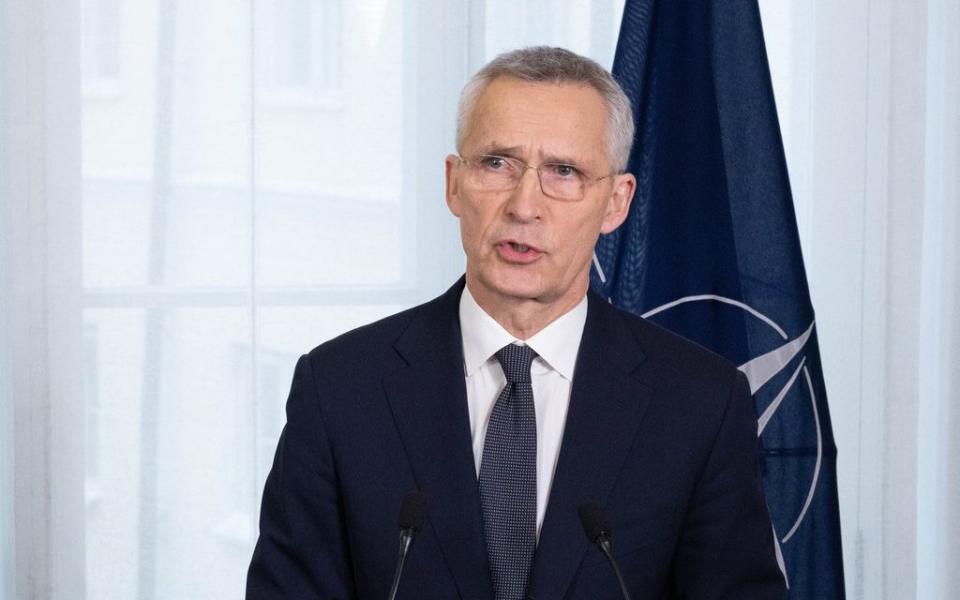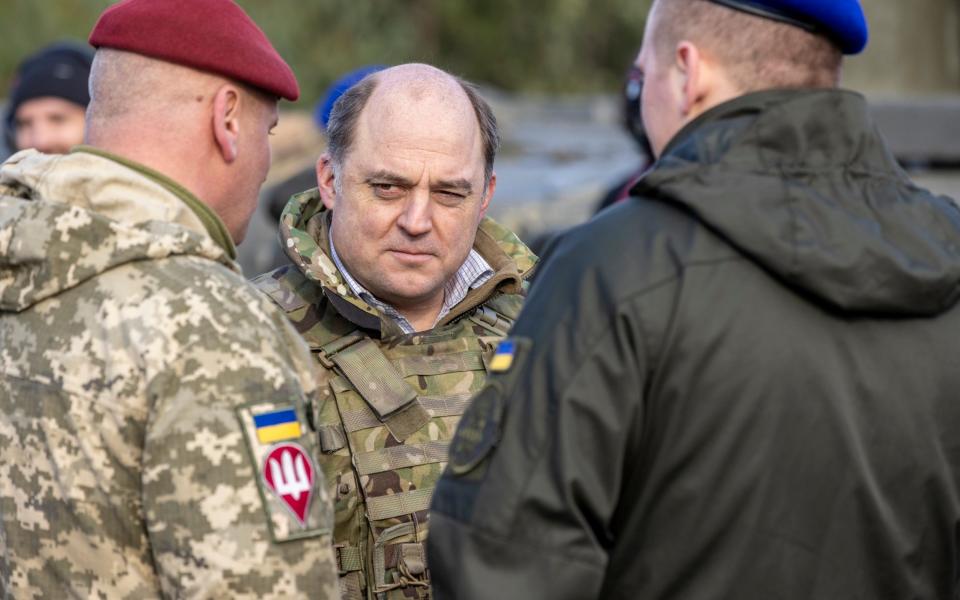China ‘lacks credibility’ to secure Ukraine ceasefire amid Russia drone fears

Nato’s top official told China that it lacked the “credibility” to broker a ceasefire in Ukraine amid fears Beijing is preparing to supply kamikaze drones to Moscow.
Western leaders were quick to question China’s motives after it published a 12-point plan for peace in Ukraine to mark the first anniversary of Russia’s illegal invasion.
Intelligence shared among Nato allies raised fears that Beijing is considering the possibility of sending weapons to aid Moscow’s war machine.
The shipment could include as many as 100 kamikaze drones that can carry warheads of up to 50kg, similar to the Iranian-made Shahed-136, according to Der Spiegel magazine.
Xi’an Bingo Intelligent Aviation, a Chinese firm, was reported to be in talks over the initial sale of 100 drones to Moscow as well as delivering the know-how so Russia can independently produce another 100 each month.
Nato, the UK and European Union said there was a lack of trust in Beijing’s plan for peace because of its failure to condemn the war and apparent bid to arm Russia.

Jens Stoltenberg, the Nato secretary general, said: “China does not have much credibility because they have not been able to condemn the illegal invasion of Ukraine.”
Antony Blinken, the US secretary of state, has previously said that the US believes China is "considering providing lethal support" to Moscow, and that would "cause a serious problem for us and in our relationship."
On Friday CNN reported that negotiations between Russia and China about the price and scope of equipment were ongoing, but that Beijing does not appear to have made a final decision yet.
Ben Wallace, the Defence Secretary, said: “It can’t help the peace if China effectively supplies the one nation that has broken the international law on the sovereignty of Ukraine and been inflicting war crimes.
“But I’m also confident that China is pretty clear that it wants this [war] to stop.”
Alicia Kearns, the head of the Commons foreign affairs committee, told The Telegraph: “I don’t believe that China wants to arm [Vladimir] Putin and become an active combatant in Putin’s crimes against humanity.
“China has repeatedly refused to back Russia at the UN, [or] endorse Putin’s renewed illegal invasion. Any decision to arm Putin now would make China culpable as an enabler of crimes against humanity.”
Beijing’s carefully-crafted 885-word “political settlement” plan was careful to refrain from describing Moscow’s actions as an “invasion”, instead calling it “the Ukraine crisis”.

Rather than present concrete details to achieve a resolution, Beijing demanded an end to Western sanctions against Russia.
China also called for nuclear facilities to be secured and for humanitarian relief, food exports, and reconstruction. It also warned against the use of nuclear weapons in the war.
Ursula von der Leyen, the European Commission president, said: “We will look at the principles, of course, but we will look at them against the backdrop that China has taken sides. It is not a peace plan.”
In the year since the Russian president ordered the invasion of Ukraine, China has attempted to appear neutral while blaming Washington and Nato for escalating the conflict.
Beijing and Moscow are considered close allies, and in recent days pledged to further strengthen those ties.
The two countries’ “no-limits” bond has seen China refuse to criticise Russia or Putin for instigating war.
Wang Yi, China’s most senior diplomat, concluded a two-day visit in Moscow, where he met with Putin, but appeared to make little headway on pushing the peace plan.
Earlier this week, Chinese diplomats and state media issued comments that accused the US for “fuelling the fire”, a retort after Washington said that it warned Beijing against providing Moscow with weapons.
Wang Wenbing, a spokesman for the Chinese foreign ministry, said: “We urge the US to stop smearing China and shifting blames, and stop fanning the flame and fuelling the fight with more weaponry.”
Before the Chinese proposals were published, Olaf Scholz urged the world to be wary of the Chinese government’s intentions.
“We should have no illusions about China,” the German chancellor told his country’s broadcaster ZDF. “They have up until now not taken a stand against Russia.”
Zhanna Leshchynska, the charge d’affaires of Ukraine’s embassy in Beijing, ruled out a ceasefire on China’s terms because it would freeze the conflict along the current front line.
“Our view is that Russia should unconditionally withdraw all of its forces from the territory of Ukraine,” she told reporters.
Officials in Kyiv said that any plan to end the war must involve the withdrawal of Russian troops from Ukraine, including the Crimean peninsula that was illegally annexed by Moscow in 2014.
On Friday, Volodymyr Zelensky said he was open to cooperating with China to put an end to the war.
“China started talking about Ukraine and that’s not bad,” the Ukrainian president said. “It seems to me that there is respect for our territorial integrity, security issues.
“We need to work with China on this point... Our task is to unite everyone in order to isolate one.”

